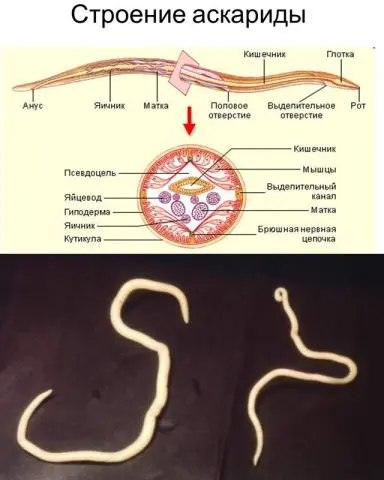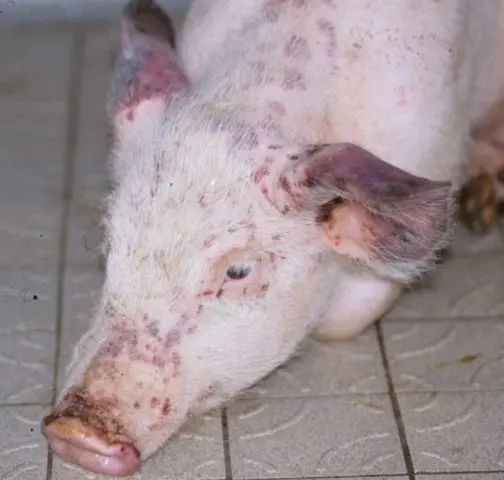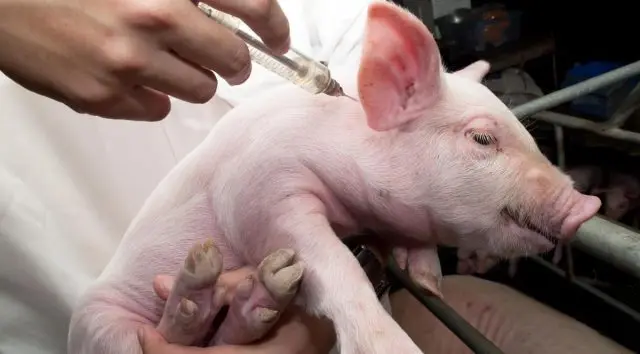Contents
- What is dangerous cough for pigs and piglets
- Signs of manifestation of the disease
- Why a pig or pig coughs: a list of possible causes
- Colds
- Inflammation of the lungs, tuberculosis
- gastric diseases
- Ascaridosis
- Other causes of cough in piglets or pigs
- Diagnosis of diseases
- How to treat cough in piglets or pigs
- Preventive measures
- Conclusion
Piglets cough for many reasons, and this is a fairly common problem that all farmers face sooner or later. Cough can be a reaction to adverse environmental conditions, or it can be a sign of a serious illness, so it is very important to take action in time.

What is dangerous cough for pigs and piglets
Coughing in piglets can be a symptom of dangerous, life-threatening animal diseases that are often treated with medication alone. Pig diseases are very similar to human diseases. It is important to be able to recognize the first signs of their manifestation in time, since many of the diseases are infectious and can be quickly transmitted from animal to animal, endangering the entire herd.
Signs of manifestation of the disease
Cough is a normal reaction of the human and animal body to external stimuli. However, when the cough persists for an extended period of time, the pigs lose their appetite and any uncharacteristic behavior occurs, the causes should be investigated as soon as possible.
Common signs of the development of diseases in pigs:
- cough;
- dry skin, rashes in the form of spots or rashes;
- tousled matte bristles;
- lethargy;
- decrease or lack of appetite;
- low or high body temperature;
- an overly excited state.
Why a pig or pig coughs: a list of possible causes
The main reasons why piglets and pigs cough are:
- poor ventilation in the room;
- the presence of mold fungi in the feed;
- lack of nutrients;
- trauma;
- colds;
- pneumonia;
- tuberculosis;
- gastroenteritis and other gastric diseases;
- ascariasis;
- the presence of a foreign body in the lungs;
- lung irritation.
Colds

If you keep piglets in unventilated, damp and cool rooms, they can catch a cold. Weakened immunity and coughing can also cause nutritional and vitamin deficiencies in the body of piglets, so it is important to use good quality balanced feed for animal nutrition.
The first signs of the onset of colds are coughing, overexcited or, on the contrary, apathetic state. Another characteristic symptom of a cold is a change in the color of the ears from pink to grayish.
Colds in piglets are recommended to be treated with specialized medications and antibiotics prescribed by a veterinarian. The best prevention is the observance of sanitary and hygienic standards and recommendations for feeding animals. To strengthen the immune system, 2 times a day, pigs are injected with 15-20 ml of glucose.
Inflammation of the lungs, tuberculosis
The cause of coughing in piglets can be pneumonia, which is caused by harmful microorganisms that have entered the body of animals. The main symptoms of this disease are:
- difficulty breathing;
- the appearance of wheezing and dry cough;
- increased body temperature;
- lethargic, apathetic state, inactivity;
- poor appetite and increased need for water;
- it is also possible the development of conjunctivitis and the formation of crusts on the skin.
Similar symptoms are also characterized by another very dangerous disease for piglets – infectious tuberculosis. When the first signs of it appear, it is necessary to isolate sick animals from the rest of the herd and call a veterinarian to conduct a smear of the mucous membranes and analyze the condition of the animal. Such an analysis will identify the causative agents of the infection and prescribe the appropriate treatment.
Inflammation of the lungs is treated with a complex of medications, including antibiotics, for example, Spiramycin, Oxytetracycline and others. To disinfect the herd, you can use aerosols such as Etazol and Norsulfazol. It is very difficult and expensive to treat tuberculosis in piglets, so sick animals are usually culled.
gastric diseases

Young piglets that are weaned early from sows and placed on a standard diet may develop gastroenteritis. The main symptom of this disease is blue ears and patches. Pigs cough, begin to suffer from constipation and diarrhea, become inactive, eat little and do not gain weight. Stomach problems can also be caused by an unbalanced diet.
Washing the gastrointestinal tract with a 0,9% saline solution will help to cope with gastric diseases in piglets. As a laxative, you can add 1 tsp to the feed. vegetable oil.
Diarrhea in piglets is usually treated with chloramphenicol. Dehydration requires the introduction of saline. In some cases, antibiotic treatment may be required. At the same time, the food must be enriched with vitamins. If the animal needs anesthesia, use a 1,5% solution of novocaine.
Ascaridosis
In some cases, coughing in piglets appears due to the presence of ascaris in the body, which grow, develop and multiply in the body of animals, choosing the intestines as their habitat.
The length of roundworm reaches 20 – 35 cm. During the day, one female lays about 200 thousand eggs, which leave the body of piglets along with their waste products and accumulate in enclosures. New animals become infected through the ingestion of roundworm eggs in the mouth. Some eggs laid in the intestine turn into larvae and break through its walls, penetrating into the blood, and then with it into the bronchi and lungs. The larvae secrete toxins into the body of piglets that cause poisoning.

The mucus fills the animal’s lungs, preventing normal breathing. Piglets develop a characteristic wet, expectorant cough. Together with the coughed up mucus, roundworms re-enter the body of pigs, contributing to re-infection. Adult parasites live in the body of piglets for 5 – 7 months, reinfection can significantly prolong the course of the disease.
Symptoms of ascariasis in pigs and piglets:
- presence of wheezing and coughing;
- difficult or rapid breathing;
- vomiting;
- poor appetite or lack of it.
If these symptoms are present, infected piglets should be isolated as soon as possible, and their places of detention should be cleaned of waste, leftover food and water. The next step is to disinfect the enclosures, for which you can use a 5% potassium solution or a 3% iodine solution. To prescribe medication, you should contact a veterinarian who can prescribe drugs such as Albendazole, Fenzol and others. Tansy flowers are considered a good folk remedy for ascaris.
Other causes of cough in piglets or pigs

There are other causes of coughing in piglets, which include development:
- pasteurellosis;
- salmonellosis;
- African swine fever;
- Aujeszky’s disease.
These diseases are extremely dangerous and can take the life of an animal in a matter of hours. It is important to isolate coughing piglets in a timely manner and call the veterinary service.
alien body
Another reason that the piglet is coughing may be a foreign body that has entered the body along with food. Usually the treatment proceeds naturally and does not require third-party intervention, however, in some cases it may be necessary to seek the help of a professional veterinarian.
Lung irritation
Lung irritation is a non-contagious cause of cough in piglets. It can be caused by gaseous allergens such as ammonia or dust particles in the feed. Therefore, when a pig eats, it coughs, inhaling too much crushed food, which enters the lungs, causing them to become inflamed.
Diagnosis of diseases
It is often possible to save a pig, and sometimes an entire herd, only with the timely detection of signs of the disease. Therefore, on an ongoing basis, it is recommended to conduct diagnostics of the condition of animals, including:
- control of appetite;
- checking the respiratory rate;
- examination of the mouth, nose and eyes for the presence of various secretions;
- examination of the body and limbs for the presence of neoplasms and tumors;
- control over changes in the color and condition of feces and urine;
- check feces for the presence of helminths.
If piglets are coughing or otherwise feeling unwell, the first step is to take their temperature. The norm is the body temperature of animals 38 – 40 oC. Diagnosis of viral diseases is carried out through laboratory tests.
How to treat cough in piglets or pigs
The first thing to do if a pig is coughing is to put it in a separate, isolated enclosure and call a veterinarian for an accurate diagnosis, since the methods of treating various diseases are very different. Improper treatment can provoke complications, up to the death of the animal.
So, for example, with pneumonia in piglets, broad-spectrum antibiotics are used: Oxytetracycline, Tilan, Bicillin. The introduction of drugs is carried out intramuscularly. As necessary, after 7-10 days, the course of treatment can be repeated.

You can treat a pig that is coughing due to worms with Albendazolo, Levamisole, Ivermectin: dosages are selected by the doctor, depending on body weight. After treatment for helminths, pigs can be slaughtered only after 10 days.
When infected with African plague, sick individuals must be taken to slaughter, and the room must be disinfected with a 2% formaldehyde solution so that the infection does not subsequently spread to healthy animals.
Preventive measures
For the prevention of diseases, first of all, it is necessary to provide piglets with proper living conditions. The room must be dry, warm and clean. To avoid the accumulation of harmful gases, it is important to remove manure in time and monitor the balance of the animals’ diet.
In order for the piglets to be strong, pre-start compound feeds are introduced into their diet from the 5th – 7th day of life. Weaned babies require special attention, as separating them from their mother is a stressful situation that contributes to the development of diseases.
In addition, great attention should be paid to the transportation of animals. Pigs are not recommended to be transported on cold and damp days. Before transportation, it is desirable to use anti-stress drugs (tranquilizers, lithium salts, succinic or ascorbic acid).
On farms affected by infections, allogeneic sera are used to treat healthy animals. In the presence of animals, the room can be disinfected with a 1-2% solution of chloramine.
For the purpose of general disinfection of enclosures, use:
- 20% suspension of freshly slaked lime;
- 4% sodium hydroxide solution;
- 2% iodine monochloride;
- calcium hypochlorite solution containing at least 3% active substance;
- 4% hydrogen peroxide solution.
Conclusion
The best solution in case piglets are coughing is to call a veterinarian. He will help to quickly establish the causes of coughing and will be able to prescribe effective treatment in time, on which the life of animals often depends.









